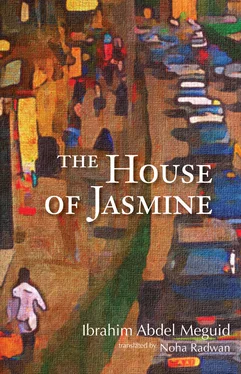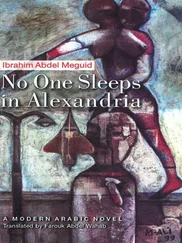Months passed, and on Labor Day I remembered al-Dakruri and almost cried. I still didn’t know what al-Dakruri wanted from me, or for me. Why had he remained silent about my crimes, which could have gotten him promoted to high heaven if he had reported on them?
As usual, only the members of the workers’ union attended the Labor Day celebrations. Alexandria looked grim as the summer began with sand storms that engulfed the city in sand. I prepared my fishing equipment and bought a new reel. I thought of showering Hassanayn and his gentle wife with gifts of Buri and Dinis fish. I didn’t know that I wouldn’t get a chance to go fishing.
Usta Zinhum walked into my office. I had almost forgotten him and, maybe for that reason, I tried to receive him very warmly, and with a big smile. Suddenly he said, “You know, of course, that al-Dakruri is dead.”
I smiled, but didn’t reply, so he went on: “The elections of the workers’ unions are going to be held next August, and we have nominated you to be the president of the shipyard’s workers’ union.” It took me a minute to grasp the meaning of what he’d said — president of the union. . they nominated me!
“Me?” I asked.
“Of course,” he said. I looked at him for a few moments while I scratched my head with my left hand, and then asked again, “Me?”
“Of course.” Then he smiled, and I smiled in turn.
“It isn’t a puzzle, Mr. Shagara,” he said. “The decision has been made.”
“Whose decision?”
“Mine, and that of my fellow drivers and the other workers.”
I leaned back in my seat and continued to inspect him. He was very fat, almost filling my entire office with his bulk. His words come out of his small mouth as if they were pouring out of a hole in a barrel, but he talked with such self-confidence that he seemed quite comical. I became very suspicious. I remembered the day when President Sadat returned from Camp David, and how Usta Zinhum and his fellow drivers conspired against me, and how he alone, or together with the rest of them, kept the money from the workers’ lunches for himself.
“What is it that you really want?” I asked him.
“Nothing. You are the best candidate for the position. Al-Dakruri didn’t serve the interests of the workers. He was an opportunist who worked for his own interest.”
He remained silent for a few moments after this last statement. The man was talking politics. This creep was talking politics. Al-Dakruri, who had to give up smoking in order to get married, was an opportunist? Al-Dakruri, who was always pale with malnutrition, didn’t serve the workers? Al-Dakruri, who allowed me and this fat hyena to steal the shipyard’s money, was an opportunist who didn’t serve the workers?
“Usta Zinhum, the days of the reception rallies are over,” I said. “The country is in a state of turmoil, as you know. Or don’t you know? Opposition, and civil strife, and every day a secret party is uncovered and dissolved — Muslims, communists, Libyan agents, Yemeni agents, and the President is insulting the people day and night. And you want me to run in the elections?”
I watched him as he put out his lower lip, then he shrugged his left shoulder. He wanted to bring his mouth close to my ear but my desk and his huge pot belly kept him at a distance.
“What’s all that to us?” he whispered.
#
The fishing equipment remained unused in a corner of the kitchen, covered with a layer of dust. Usta Zinhum had managed to wear me out. I discovered that he had more energy than I did. He always raced me into the workshops of the shipyard and called out to the workers to gather around me. They all shook hands with me with big smiles, but they never talked with me about anything. I expected them to ask a lot of questions of every kind, and to present demands, but they only smiled, shook my hand, wished me success, and then returned to their work.
I felt the absurdity of my campaign tours and thought that a kind of idiocy was taking hold of us all. Usta Zinhum said that this was normal during any election campaign.
“What is important is that the workers see you among them as much as possible,” he said. This was not easy to do, but Usta Zinhum somehow convinced the engineers and department managers to allow me into the workshops and laboratories. He formed a team of drivers who printed posters, fliers, and other campaign literature that bore some of the phrases I had repeatedly seen on posters for other electoral campaigns—“Shagara is the best to represent you,” and “Shagara is the workers’ advocate.”
Why had I gotten myself into all this? I didn’t know. I just followed Usta Zinhum, who was always ahead of me. It was the first time that I’d seen all of the shipyard where I had been an employee for thirteen years — the long stretches of open space between the workshops, still pleasant despite the long tin sheets stored there, the large wooden boxes and the cranes in the air. In the workshops, I smelled the grease and oil on the floor and the workers’ clothes and smelled the welding materials and the melted iron. I saw workers moving around energetically and cheerfully, bending over the huge lathing and milling machines and the cutters for metal sheets in a manner that was both friendly and humble. Many of the workers had familiar faces because they had come to my office in the past asking for some certificate or document or wanting to file one with me. I discovered the value of my own work. It wasn’t just paperwork. Each of the files held a worker’s life. They told of raises, promotions, and wage cuts, of sickness, absence, marriage, and childbirth. I also discovered that among the workers of the shipyard, I was the best-known administrative employee.
I spent a long time with a few workers while they assembled a ship. The sea breeze was blowing, entering our mouths and noses and going into our chests. The sea here wasn’t quite the same as the sea I saw from the balcony of my apartment. Here it bustled with white ships that filled the port, their short, stocky black chimneys, and the naked chests of their sailors glistening in the sunlight. The sun looked as if it were blessing this vigorous world and the waves hitting the piers sounded like sighs or a sweet lullaby.
Every morning when I went to the shipyard I found some reason to renew my resolution to run for the elections, but at the end of every day, when I returned to my apartment with burning exhausted feet, I decided to quit. Usta Zinhum and several other drivers came to my apartment sometimes to talk about the need to buy a new piece of land on which to build new housing for the workers and the need to build a mosque in the middle of this piece of land. I only smiled and said, “ Insha’ Allah. ” They also said that I should get married so that I wouldn’t be lonely in my apartment. Usta Zinhum even surprised me once by saying that if I really wanted to get married, then I only had to tell him and he would take care of it all. He actually said that! I tried to ignore it. I nearly exploded and screamed at him that he shouldn’t forget that he was indebted to me, and that he was seeking some personal gains out of this whole campaign, whereas I had nothing to gain from the union and the workers’ problems. But I only changed the subject, telling him that I had little experience with the workers and their problems.
“Has anyone asked you any questions?” he asked.
“No,” I replied.
“Then there is no problem,” he said, and urged me to go to the cafés around the shipyard in such neighborhoods as Qabbari, Mafruza, and Wardiyan, where most of the workers lived. He said that this had only been done by the candidates for the People’s Assembly and the local councils, that it would guarantee my victory, and that it was especially important because some of the older members of the union were making a fuss over my nomination. He said that they were spreading rumors that I was, after all, a white-collar employee who knew little about the workers, that I was not one of them even if I didn’t have a college degree.
Читать дальше












